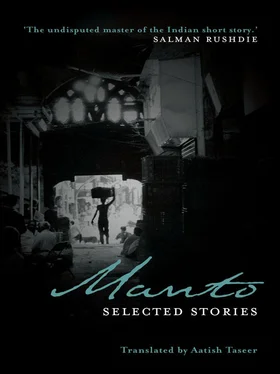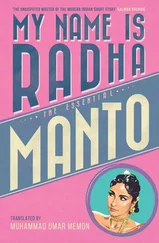She didn’t reply immediately to my question, but rose from the charpoy and went to sit at my desk. ‘I tore at him,’ she said at last. ‘I clung to him like a junglee cat. He clawed at my face; I clawed at his. For a long time, we wrestled with each other. And… he had the strength of a wild cat, but… But, like I once told you, I’m a fierce woman. My weakness, the weakness that the malaria had left — I didn’t feel at all. My body was burning up; sparks flew from my eyes; my bones stiffened. I caught him and began fighting him like a cat. I don’t know why or for what reason, I attacked him. Nothing passed between us that could be misconstrued. I was shrieking; he was groaning. I clawed the flowers from his white khadi kurta; he ripped several clumps of my hair from their root. He used all his strength, but I had already decided that victory would be mine. In the end, he lay on the carpet lifeless. I was panting, as if my breathing was about to stop. And though I was short of breath, I shredded his kurta to pieces. It was at that exact moment when I saw his firm, wide chest that I understood what it had been — what we’d tried, and failed, to understand…’ She got up quickly and threw her dishevelled hair to one side with a jerk of the head. ‘Sadaq,’ she said, ‘the bastard! His body really was beautiful. I don’t know what got into me. I lowered my head and began biting into it. He just lay there, whimpering. And when I joined my bleeding mouth to his and gave him a wild, heated kiss, he became cold, like a woman resigned to her fate. I got up and felt an immediate loathing for him. I looked down at him. My blood and lipstick had left vile, almost floral bruises on his beautiful body. When I looked up at my room, everything in it seemed illusory. And so I threw open the door, from fear that I would suffocate, and came directly to you.’
With this, she was silent, like a corpse. I became afraid; I touched her hand; it hung limply at her side, and was burning hot.
‘Neelam… Neelam.’
I called her name many times, but she didn’t respond. When at last I called it loudly, and in a frightened voice, she gave a start. Rising to leave, she said only this: ‘Saadat, my name is Radha.’
* The word in Urdu is tawwaif, which covers anything from a working prostitute to a dancing girl or courtesan.
* Spanish cherry tree
I had just killed a bedbug, and was going through some old papers in a trunk, when I discovered Saeed bhaijan’s picture. I put the picture in an empty frame lying on the table and sat down to wait for the dhobi.
Every Sunday I would wait like this, because by the end of the week, my supply of clean clothes had run out. I can hardly call it supply; in those days of poverty, I had just about enough clothes to meet my own basic standards for five or six days. My marriage was being negotiated at the time and because of this I had been going for the past two or three Sundays to Mahim.
The dhobi was an honest man. Despite my sometimes being unable to pay him, he would return my clothes every Sunday by ten. I was worried that one of these days he would grow tired of my unpaid bills and sell my clothes in the flea market, leaving me with no clothes in which to negotiate my marriage. Which, needless to say, would have been cause for great humiliation.
The vile, unmistakable stench of dead bedbugs filled my room. I was wondering how to dispel it when the dhobi arrived. With a ‘salaam saab’, he opened his bundle and put my clean clothes on the table. As he was doing this, his gaze fell on Saeed bhaijan’s photograph. Taken aback, he looked closely at the picture and emitted a strange sound from his throat: ‘He, he, he, hein?’
‘What’s the matter, dhobi?’ I asked.
The dhobi’s gaze fixed on the picture. ‘But this, this is barrister Saeed Salim!’
‘You know him?’
The dhobi nodded his head vigorously. ‘Yes, two brothers. Lived in Colaba. Saeed Salim, barrister. I used to wash his clothes. ’
Saeed Hassan bhaijan and Mahmood Hassan bhaijan, before immigrating to Fiji, did in fact have a practice in Bombay for a year, but this would have been a few years ago.
I said, ‘You’re referring to a couple of years ago?’
The dhobi nodded vigorously again. ‘Saeed Salim barrister when he left, he gave me one turban, one dhoti, one kurta. New. They were very nice people. One had a beard, this big.’ He made a gesture with his hand to show the length of the beard. Then pointing to Saeed bhaijan’s picture, said, ‘He was younger. He had three little runts… they used to like to play with me. They had a house in Colaba; a big house!’
I said, ‘Dhobi, they’re my brothers.’
The dhobi made that strange ‘he, he, he, hein?’ sound again. ‘Saeed Salim, barrister?’
To lessen his surprise, I said, ‘This is Saeed Hassan’s picture and the one with the beard is Mahmood Hassan, the eldest.’
The dhobi stared wide-eyed at me, then surveyed the squalor of my room. It was a tiny room, destitute of even an electric light. There was one table, one chair and one sack-covered cot with a thousand bedbugs. He couldn’t believe I was barrister Saeed Salim’s brother, but when I told him many stories about him, he shook his head incredulously and said, ‘Saeed Salim, barrister lived in Colaba, and you in this quarter?’
I responded philosophically: ‘The world has many colours, dhobi. Sun in places; shade in others. Five fingers are not alike.’
‘Yes, saab. That is true.’
With this, he lifted his bundle and headed to the door. I remembered his bill. I had eight annas in my pocket, which would barely get me to Mahim and back. But just so that he knew I was not entirely without principles, I said, ‘Dhobi, I hope you’re keeping accounts. God knows how many washes I owe you for.’
The dhobi straightened the folds of his dhoti and said, ‘Saab, I don’t keep accounts. I worked for Saeed Salim barrister for one year. Whatever he gave me, I took. I don’t know how to keep accounts.’
With this he was gone, leaving me to get dressed to go to Mahim.
The talks were successful. I got married. My finances improved too. I moved from the single room in Second Pir Khan Estates where I paid nine rupees a month, to a flat on Clear Road where I could afford to pay thirty five rupees a month. The dhobi also began to receive his payments on time.
He was pleased that my finances had improved. He said to my wife, ‘Begum saab, saab’s brother Saeed Salim barrister was a very big man. He lived in Colaba. When he left, he gave me a turban, one kurta and one dhoti. Your saab will also be a big man one day.’
I had told my wife the story of the picture and of the generosity the dhobi had shown me in my days of penury. When I could pay him, I had paid him, but he never complained once. But soon my wife began to complain that he never kept accounts. ‘He’s been working for me four years,’ I told her, ‘he’s never kept accounts.’
She replied, ‘Why would he keep accounts? That way he could take double and quadruple the amount of money.’
‘How’s that?’
‘You have no idea. In a bachelor’s household where there are no wives, there are always people who know how to make idiots of their employer.’
Nearly every month there was a dispute between my wife and the dhobi over how he did not keep an account of the clothes washed. The poor dhobi responded with complete innocence. He said, ‘Begum saab, I don’t know accounts, but I know you wouldn’t lie. Saeed Salim barrister, who is your saab’s brother, I worked for one year in his house. His begum saab would say, “Dhobi, here is your money”, and I would say, “Alright.” ’
One month, a hundred and fifty pieces of clothing went to the wash. To test the dhobi, my wife said, ‘Dhobi, this month sixty items of clothing were washed.’
Читать дальше












